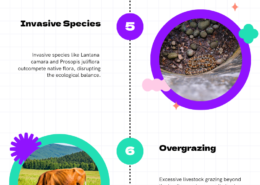Roadmap for Answer Writing 1. Introduction Briefly introduce the significance of forest resources in India. State the current status of forest cover and the implications for climate change. Fact to Use: India’s forest cover is approximately 24.56% of its total geographical area, with a loss ...
Model Answer Introduction Mangroves are crucial components of coastal ecosystems, delivering a multitude of ecological, economic, and cultural benefits. However, they have faced significant depletion in recent decades, with estimates indicating that up to 50% of mangrove forests have been lost globaRead more
Model Answer
Introduction
Mangroves are crucial components of coastal ecosystems, delivering a multitude of ecological, economic, and cultural benefits. However, they have faced significant depletion in recent decades, with estimates indicating that up to 50% of mangrove forests have been lost globally.
Causes of Depletion of Mangroves
1. Deforestation
The primary driver of mangrove depletion is deforestation, primarily due to the conversion of mangrove forests for agriculture, aquaculture, and urbanization. For instance, the Sundarbans in Bangladesh has seen substantial loss due to these pressures.
2. Climate Change
Climate change significantly impacts mangroves, with rising sea levels and altered precipitation patterns leading to coastal habitat loss. Saltwater intrusion from rising sea levels further endangers mangrove survival.
3. Pollution
Pollution, especially from oil spills and runoff from agricultural practices, severely affects mangroves. The expansion of shrimp farms has contributed to approximately 35% of the overall loss of mangrove forests, leading to habitat destruction and compromised marine health.
4. Overfishing
Overfishing disrupts the ecological balance of mangrove ecosystems, reducing the abundance of fish and other marine life reliant on these habitats for survival.
Importance of Mangroves in Coastal Ecology
1. Shoreline Stabilization
Mangroves act as natural barriers against coastal erosion, helping to stabilize shorelines and prevent land loss to the sea.
2. Biodiversity Conservation
They provide essential habitats for diverse plant and animal species, including many endangered ones, serving as nurseries for juvenile fish and other marine organisms.
3. Carbon Sequestration
Mangroves are effective carbon sinks, storing up to five times more carbon per hectare than tropical forests, making them vital in combating climate change.
4. Coastal Protection
Mangroves mitigate storm impacts and reduce the risk of damage to coastal communities during natural disasters.
5. Economic Benefits
They offer significant economic advantages to local communities through timber, non-timber products, fisheries, and tourism.
Conclusion
Mangroves are essential yet threatened ecosystems. Their depletion poses serious implications for coastal ecology, necessitating conservation, sustainable management, and restoration efforts to ensure their long-term health and resilience.
See less

Model Answer Introduction India’s forest cover is approximately 24.56% of its total geographical area, according to the India State of Forest Report 2019. However, the country has lost about 9.38 million hectares of forest cover between 1991 and 2019, raising concerns about environmental sustainabilRead more
Model Answer
Introduction
India’s forest cover is approximately 24.56% of its total geographical area, according to the India State of Forest Report 2019. However, the country has lost about 9.38 million hectares of forest cover between 1991 and 2019, raising concerns about environmental sustainability and climate change.
Status of Forest Resources
Mangrove Cover
Mangroves are crucial ecosystems that provide coastal protection, support biodiversity, and sequester carbon. India has around 4,975 square kilometers of mangrove cover, with the Sundarbans delta being the largest mangrove forest globally.
Bamboo Cover
Bamboo is a fast-growing renewable resource that plays a vital role in the economy and environment. India holds the largest area under bamboo cultivation in the world, covering approximately 2 million hectares.
Increase in Forest and Tree Cover
The total forest and tree cover in India increased by 13,000 square kilometers from 2017 to 2019, thanks to government initiatives like the Green India Mission and the National Agroforestry Policy.
Total Carbon Stock
Indian forests store around 7,124 million tonnes of carbon. Deforestation and degradation release significant amounts of carbon dioxide, contributing to global warming. Therefore, preserving and increasing forest cover is essential for climate change mitigation.
Impact on Climate Change
Forests serve as vital carbon sinks, absorbing carbon dioxide from the atmosphere. They also regulate local weather patterns, prevent soil erosion, and combat desertification. The degradation of forests exacerbates climate change by releasing stored carbon and reducing the land’s capacity to sequester more.
Vulnerability to Climate Change
India is particularly vulnerable to climate change due to its extensive coastline, dense population, and reliance on agriculture. The country faces extreme weather events, such as droughts and floods, which threaten food security and public health.
Conclusion
India’s forest resources are critical for mitigating climate change and providing ecological, economic, and social benefits. Protecting and enhancing these resources is vital for sustainable development and resilience against climate-related challenges.
See less